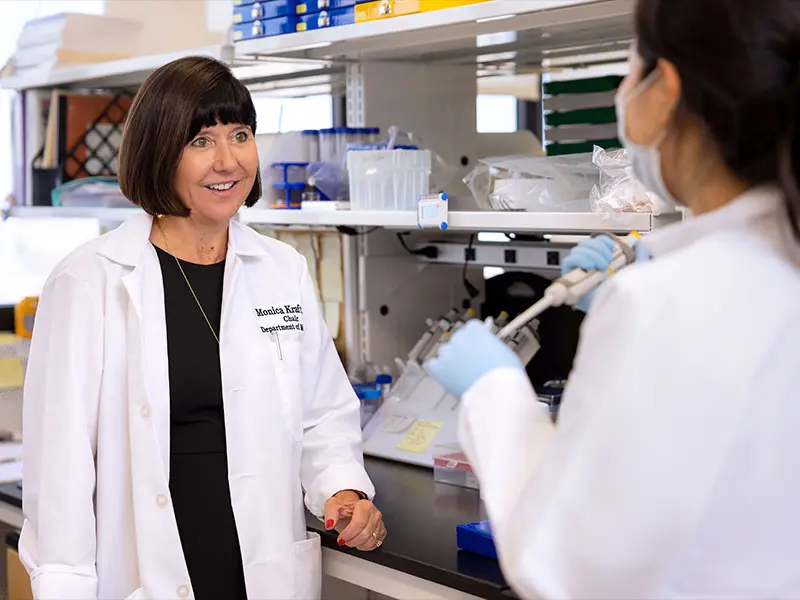For many years, Monica Kraft, MD, collaborated with the Department of Medicine at the Mount Sinai Health System and the Icahn School of Medicine at Mount Sinai on research projects. Now, she is running it.
According to Dr. Kraft, who became the Murray M. Rosenberg Professor of Medicine and Chair of the Department of Medicine at Icahn Mount Sinai in July 2022, it was an opportunity that offered fresh challenges. Prior to joining Mount Sinai, she was the Robert and Irene Flinn Endowed Professor and Chair of the Department of Medicine, and Deputy Director of the Asthma and Airways Disease Research Center, College of Medicine, Tucson, at the University of Arizona Health Sciences. While there, she led an effort to rebuild the department, recruiting 250 faculty members and eight division chiefs, launching new programs and services, and enhancing the educational experience for trainees.
“That position was great in terms of preparing me to step into this role,” Dr. Kraft says. “The main difference is the larger scale, from the size of Mount Sinai’s faculty to the competitiveness of its health care marketplace.”
While at the University of Arizona, Dr. Kraft collaborated extensively with Mount Sinai researchers such as Linda Rogers, MD, Associate Professor of Medicine (Pulmonary, Critical Care and Sleep Medicine), Icahn Mount Sinai; Clinical Director, Adult Asthma Program, at Mount Sinai – National Jewish Health Respiratory Institute; and Clinical Director, Medicine Clinical Trials Office, through the American Lung Association consortium and on the Precision Interventions for Severe and/or Exacerbation-Prone Asthma (PrecISE) Network Study.
“This is an exceptional department of medicine that is strong in all three missions—clinical care, research, and education—which was a huge draw for me. The fact that this was a system role in the large department of a very large health system was also attractive for me.”
Her goal is to build on the activity and legacy established by a department with 14 divisions; more than 2,500 faculty members, trainees, and staff; and $124 million in National Institutes of Health (NIH) funding. She is increasing integration across the system to ensure the quality of care is consistently outstanding. She is interested in initiatives that reaffirm Mount Sinai’s excellence in education, and she wants to achieve a top 10 ranking for the Department of Medicine in the Blue Ridge Institute for Medical Research’s NIH funding list. In 2021, Blue Ridge ranked the department No. 13.
“That is going to require some strategic investments in our research portfolio,” Dr. Kraft says. “I have convened a committee to assist me in that effort and we have identified some remarkable recruits to make that happen.”
In addition to these activities, Dr. Kraft is continuing to advance understanding of asthma and chronic obstructive pulmonary disease through her research. She is leading clinical trials such as PrecISE that are evaluating treatments for asthma and is working with leaders in clinical research at Mount Sinai to implement more trials in many disciplines throughout the Health System.

Monica Kraft, MD, will continue her own research into asthma and chronic obstructive pulmonary disease in addition to leading Mount Sinai's Department of Medicine.
Dr. Kraft is also the recipient of a U19 grant for Dysfunction of Innate Immunity in Asthma, a collaborative multicomponent exploration of the impact of viruses, bacteria, and allergens on the asthmatic lung. Dr. Kraft is leading a project that is investigating SARS-CoV-2 infection among patients with asthma. Using available datasets, she found that proteins produced among patients who have mild to moderate eosinophilic asthma downregulate the angiotensin-converting enzyme 2 (ACE2) receptor that enables the virus to enter cells, resulting in a less severe disease course.
Based on those findings, Dr. Kraft is exploring whether the same phenomenon occurs among patients with severe asthma. She has continued a research bronchoscopy program at Mount Sinai that will enroll 50 individuals, including patients who have asthma and controls; collect samples; perform phenotyping; and investigate whether the mechanisms of asthma-related inflammation confer protection from severe COVID-19. She will also assess the therapeutic potential of surfactant protein A (SP-A), which plays a key role in the lung’s immune response, among this cohort.
“We have known for years that SP-A has antibacterial and antiviral properties, but it also has anti-inflammatory properties relevant to asthma,” she says. “We have developed a small peptide of surfactant protein A as a potential therapeutic, and we have received an NIH phase 2 small business grant to explore that in more detail.”
